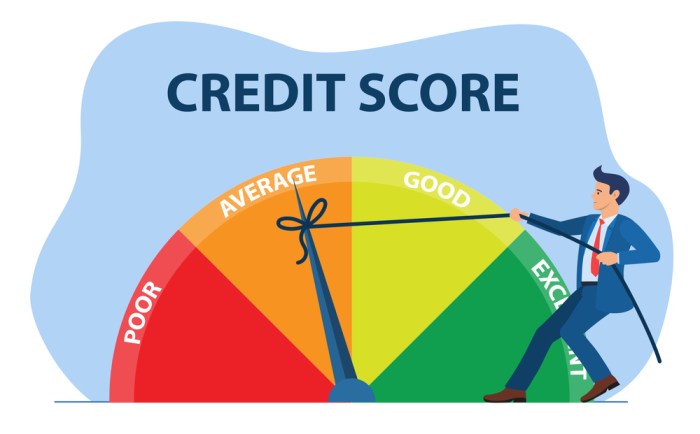Hey there, ready to dive into the world of Credit score improvement? Buckle up as we take you on a ride filled with tips, tricks, and everything you need to know to boost your credit game.
Let’s start with understanding what credit score improvement is all about and why it’s essential for your financial well-being.
Importance of Credit Score Improvement
Maintaining a good credit score is essential for overall financial health as it directly impacts various aspects of your life.
Loan Approvals and Interest Rates
Having a good credit score can significantly increase your chances of getting approved for loans, whether it’s a mortgage, car loan, or personal loan. Lenders use your credit score to evaluate your creditworthiness and determine the interest rate you qualify for. A higher credit score often means lower interest rates, saving you money in the long run.
Renting an Apartment or Home
Landlords often check credit scores before renting out their property to ensure they are dealing with responsible tenants. A good credit score can make it easier for you to secure a lease without complications or additional security deposits.
Employment Opportunities
Some employers may run a credit check as part of the hiring process, especially for positions that involve financial responsibilities. A solid credit score can demonstrate your reliability and trustworthiness, potentially giving you an edge over other candidates.
Understanding Credit Scores
A credit score is a three-digit number that represents a person’s creditworthiness based on their credit history. It helps lenders assess the risk of lending money to an individual.
Calculation of Credit Scores
Credit scores are calculated using various factors, including:
- Payment history: This accounts for the largest portion of a credit score and reflects whether payments are made on time.
- Credit utilization: This refers to the amount of credit being used compared to the total credit available. Lower utilization ratios are favorable for higher credit scores.
- Length of credit history: The longer the credit history, the better it is for the credit score.
- Types of credit: Having a mix of credit types, such as credit cards, mortgages, and installment loans, can positively impact the credit score.
- New credit: Opening multiple new credit accounts in a short period can negatively affect the credit score.
Comparison of Credit Scoring Models
Two common credit scoring models are FICO and VantageScore. While both models use similar factors to calculate credit scores, there are some differences:
| FICO Score | VantageScore |
|---|---|
| Range: 300-850 | Range: 501-990 |
| Weighted factors: Payment history, credit utilization, length of credit history, types of credit, and new credit | Weighted factors: Similar to FICO, but may weigh factors differently |
| Most widely used by lenders | Increasing in popularity |
Strategies for Improving Credit Score
Improving your credit score is essential for better financial opportunities. By following specific strategies, you can boost your credit score and pave the way for a healthier financial future.
Paying Bills on Time and Reducing Debt
- Make timely payments on all your bills, including credit cards, loans, and utilities. Late payments can negatively impact your credit score.
- Reduce your overall debt by creating a budget and prioritizing payments towards high-interest debts first. Lowering your credit utilization ratio can positively impact your credit score.
- Consider consolidating high-interest debts into a lower interest loan to make repayment more manageable.
Monitoring Credit Reports Regularly for Errors
- Check your credit report regularly to identify any errors or inaccuracies that could be dragging down your credit score.
- If you spot any discrepancies, dispute them with the credit bureaus to have them corrected and potentially improve your credit score.
- Set up credit monitoring services to receive alerts about any changes or suspicious activities on your credit report.
Rebuilding Credit after Financial Setbacks like Bankruptcy
- Focus on making timely payments and rebuilding a positive credit history post-bankruptcy. Consistent positive behavior can help improve your credit score over time.
- Consider applying for a secured credit card or becoming an authorized user on someone else’s credit card to start building credit again.
- Work with a credit counselor to create a personalized plan for rebuilding credit and improving your financial standing.
Tools and Resources for Credit Score Improvement

When it comes to improving your credit score, there are several tools and resources available to help you along the way. From credit monitoring services to secured credit cards, these resources can assist you in establishing or enhancing your creditworthiness.
Reputable Credit Monitoring Services
Credit monitoring services are essential tools for tracking changes in your credit score and monitoring any suspicious activity that could potentially harm your credit. These services provide you with regular updates on your credit report and alert you to any significant changes or potential fraud.
- IdentityForce
- myFICO
- Identity Guard
Secured Credit Cards
Secured credit cards are a great way to build or rebuild your credit. By making a security deposit, you can use a secured credit card to demonstrate responsible credit behavior and improve your credit score over time. These cards are often easier to qualify for than traditional credit cards and can help you establish a positive payment history.
- Capital One Secured Mastercard
- Discover it Secured
- Citi Secured Mastercard
Credit Counseling Agencies
Credit counseling agencies play a crucial role in assisting individuals with credit score improvement. These agencies offer financial education, debt management plans, and personalized advice to help you better manage your finances and improve your credit score. They can also negotiate with creditors on your behalf to lower interest rates or create a more manageable repayment plan.
- National Foundation for Credit Counseling (NFCC)
- Cambridge Credit Counseling
- GreenPath Financial Wellness
